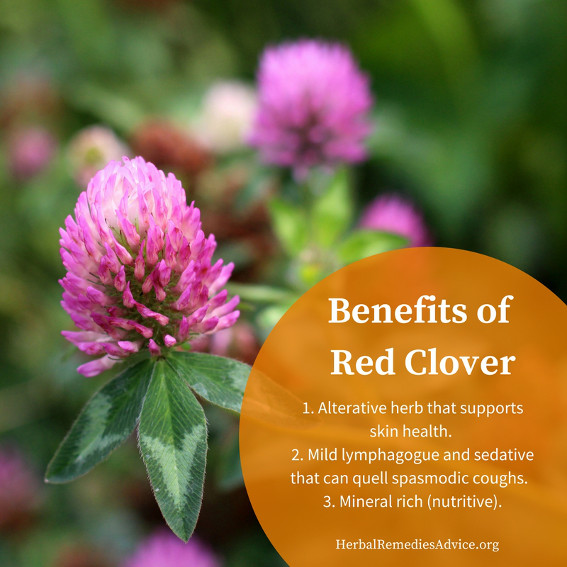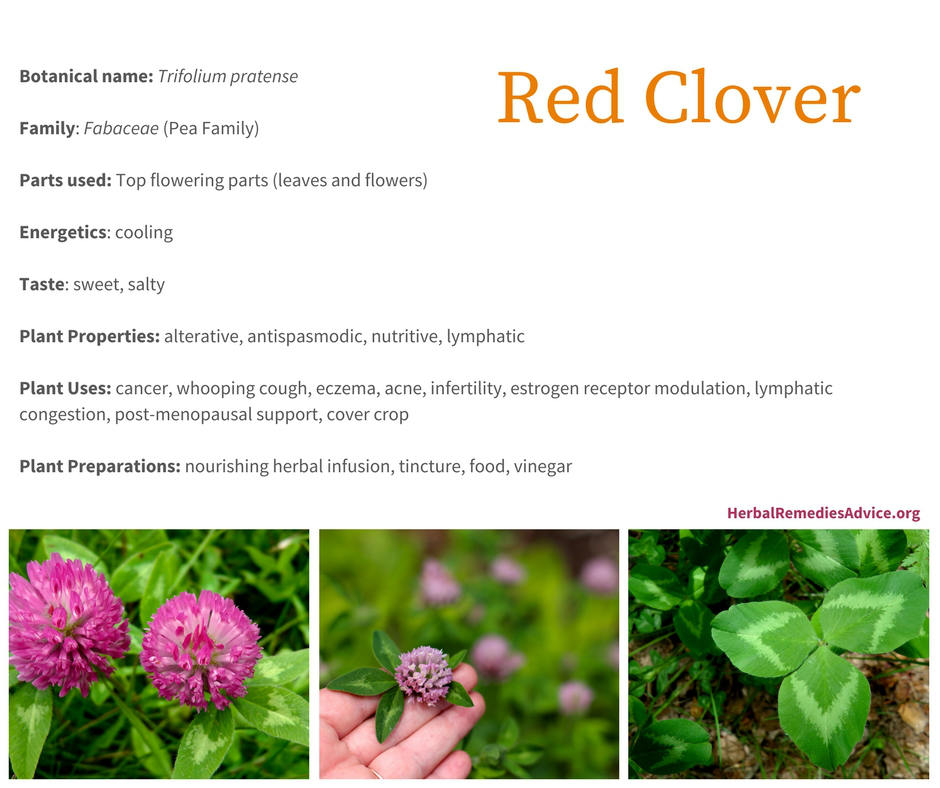Get weekly tips, recipes, and my Herbal Jumpstart e-course! Sign up for free today.

Red Clover Benefits
Share this! |
|
If you are or you know a woman of a certain age, you know how un-fun certain menopause symptoms can be. (Hot flashes, anyone?) Wouldn’t an herb that shines for menopause support, easing symptoms such as vaginal dryness and hot flashes, be a wonderful ally?
Well, that’s exactly the sort of red clover benefits you can enjoy by making cooling, soothing, nutrient-rich and delicious red clover tea (Trifolium pratense) an everyday part of your lifestyle.
And red clover tea benefits don’t stop there! (Be sure to download your free, printable recipe card below so you can start enjoying the gifts of red clover right away.)
Red clover is also wonderful for supporting skin health and clarity, gently moving lymph, protecting against xenoestrogens, easing PMS symptoms, and more!
Herbs like red clover are deeply healing and transformative if you know how to work with them well. If you’d like to know how to work with herbs holistically to support your health from the ground up, then definitely check out my free training: How to Use Herbs to Transform Your Health to get More Energy & Vitality – Without Expensive Supplements or a Restrictive Elimination Diet at http://herb-training.com
After listening in to this episode, you’ll know:
► A major difference in the way herbs and pharmaceutical drugs work in the body
► Does red clover act against cancer cells or does it promote cancer cells?
► Why red clover is one herb that is really worth growing yourself if at all possible
-- TIMESTAMPS --
- 00:00 - Introduction to red clover (Trifolium pratense)
- 03:54 - Red clover energetics
- 04:21 - Red clover as an alterative
- 07:48 - Red clover as an herb for menopause support and more
- 11:33 - Red clover benefits and cancer
- 13:01 - Red clover tea benefits for coughs
- 13:22 - Red clover for Insulin Resistance and Type 2 Diabetes?
- 13:45 - Safety considerations for red clover
- 15:16 - Red clover tea benefits
- 19:03 - Herbal tidbit
Download Your Recipe Card!
l
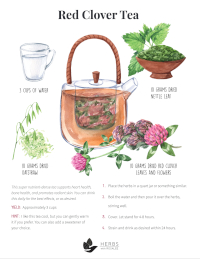
Transcript of the Red Clover Benefits Video
Red clover has been a favorite herb of folk herbalists for many years, playing a prominent role in many Western herbal formulas, notably the Trifolium Compound of the Eclectic herbalists, the Hoxsey Formula, and Essiac. While it was traditionally used as an alterative and anti-cancer herb, in more recent years, red clover has made the headlines due to its gift as an herb for menopause support.
Before we go any further, let’s make sure we’re talking about the same plant. Red clover, or Trifolium pratense, is one of many clovers. It’s a member of the pea family and is native to Europe and North Africa, but has become naturalized in many places across the globe, including North and South America.
It’s an herbaceous plant that can grow as an annual or a short-lived perennial.
Red clover grows 1-2 feet in height from a central crown.
The leaves have three parts (which is called trifoliate) and have a lightly-colored crescent or chevron on each leaflet.
The flower heads of Trifolium pratense are light pink to purple in color and contain the familiar flower parts of the Fabaceae, including the banner, wings and keel. The flowers are grouped together in a dense head (an inflorescence) and are often visited by native bumblebees.
The root is a single taproot that is not traditionally used in herbal medicine.
It’s important to be able to identify Trifolium pratense, specifically because we don’t have historic or clinical evidence of other clovers like white clover or crimson clover being used in similar ways as red clover. There have been a couple studies showing there is a significant difference in the individual chemical constituents of various clovers, meaning that other types of clover probably do not substitute for the actions of red clover or Trifolium pratense.1
Do you have experience with red clover benefits? I’d love to hear about it in the comments at the bottom of this page. Your comments mean a lot to me! I love cultivating a community of kind-hearted plant-loving folks! Plus, it’s always interesting and insightful to hear the experiences of plant lovers out there. Your suggestion may also help others!
Okay, let’s dive in..
Red Clover Benefits: Energetics
Sweet, cooling, and tasty, red clover offers us both food and medicine all wrapped up in a pretty package. It’s rich in nutrients, including minerals (like calcium, magnesium and potassium) and many polyphenols and phytoestrogens.2 Because of its nutrient density, red clover is commonly recommended as a preventive remedy to maintain health.
Red Clover Benefits: as an Alterative
One of red clover’s most prominent gifts is as an alterative herb. The alterative action is one of the most important and, quite honestly, most interesting of the herbal actions. As a result, alteratives are often some of our most reached-for herbs. Their gifts and effectiveness don’t come from a heavy-handed approach, but rather from their ability to support all the amazing things your body already does.
The definition for alterative varies widely, ranging from “altering a person towards health” to the historic concept of addressing “bad blood.” Older herbal literature often describes “bad blood” as an indication for alterative herbs, with specific issues being skin diseases such as eczema and psoriasis, chronic inflammation, chronic infections, skin ulcers, and glandular swellings.
I define alteratives as herbs that help the body eliminate metabolic wastes. Our bodies naturally perform elimination actions every day and even every moment and alterative herbs can further assist in that process.
In other words, alterative herbs help your body to do all the amazing and powerful things it can already do. They can help restore liver function, move stagnant lymph, and promote digestion.
Your body is wise! It knows how to function and how to heal, but it also can use a helping hand from time to time and alterative herbs do just that. Red clover is often paired with other alterative herbs like burdock, dandelion, nettle, and yellow dock.
Red clover especially shines in supporting skin health. Herbalists use it to address acne, blemishes, inflammation, and rashes. It also can gently move the lymph and was historically used for scrofula, a disease of lymphatic swellings related to a form of tuberculosis
Red clover offers us a glimpse into a different healing paradigm than is typically found in western society.
In western medicine it’s more common for pharmaceutical drugs to be used to alter someone’s physiology in a suppressive way. For example, proton pump inhibitors (PPIs) suppress stomach acid. Many allergy medicines suppress histamine. Steroids suppress inflammation. These types of drugs aren’t designed to help your body work better, they are designed to chemically suppress something. Many times they do offer temporary relief, but without ever addressing the root cause of an issue. As a result, doctors often prescribe these medications with the intention that the person will have to rely on them long term, which in many cases, isn’t safe.
Many times people wonder if an herb works as well as a pharmaceutical. My response is almost always that you simply can’t compare the two. Herbs are deeply healing and transformative, if you know how to work with them well.
If you’d like to know how to work with herbs holistically, to support your health from the ground up, then definitely check out my free training: How to Use Herbs to Transform Your Health to get More Energy & Vitality – Without Expensive Supplements or a Restrictive Elimination Diet.
You can access this free training at herb-training.com.
Red Clover Benefits for Menopause Support and More
There’s a lot of controversy surrounding red clover and whether or not it offers menopause support.
So let’s dive into this a bit deeper.
Estrogen is a natural hormone found in all genders. It’s important for bone growth, blood clotting, and reproduction.
The amount of estrogen produced in the body is tightly regulated through biochemical pathways. However, in modern times these pathways are being infiltrated by imposters.
Xenoestrogens are a type of endocrine disruptors that wreak havoc on our natural hormones by mimicking estrogen. By binding or blocking our natural estrogen, they can increase the total amount of estrogen, resulting in a hormone imbalance of estrogen dominance.
Unfortunately, xenoestrogens are increasingly common and can be found in skin care products (parabens), in containers and plastics (BPA, phthalates), and even in the artificial colorings of foods (FD&C Red No. 3, etc).
While limiting xenoestrogens is important, there’s more that you can do.
Red clover is high in phytoestrogens, which is a diverse group of compounds found in many different food plants, including seeds, grains, and beans.
Regularly eating foods and herbs high in phytoestrogens can block xenoestrogens from your estrogen receptor sites. Imagine a large table with many seats. When your natural estrogen and phytoestrogens are sitting at the table, there’s simply not enough room for uninvited guests such as xenoestrogens.
Red clover has long been a favorite herb for supporting healthy hormones for various stages of life, including as an herb for menopause support.
Herbalists commonly recommend red clover for hormonal imbalances including infertility and premenstrual syndrome (PMS) symptoms, especially sore breasts.
Trifolium pratense is especially favored for menopausal symptoms such as vaginal dryness, osteoporosis, and hot flashes.
Numerous studies have demonstrated that isoflavone extracts of red clover have beneficial effects in post-menopause.
A double-blinded cross-over study in 2020 showed that fermented red clover extract had a positive benefit on skeletal muscle in early postmenopausal women.3
One 12-week trial showed that people taking red clover leaves had significantly fewer menopausal symptoms than those taking a placebo.4
Numerous studies, including a meta-analysis, have shown extracts of red clover to be safe and effective for hot flashes in particular.5,6,7,8 In the future,I would love to see human clinical trials performed using the whole herb rather than these isolated extracts.
Red clover as an herb for menopausal support has many applications. For example, a couple of studies have shown it to be helpful for heart health. One study showed that supplementation with red clover can support heart health by reducing vascular inflammation in early post-menopausal women.9 Another study showed that an herbal combination with the extracts from red clover and hops, appeared to be effective in protection of endothelial function against oxidative stress and estrogen depletion.10
Phytoestrogens from many plants and herbs are considered beneficial for menopause support. One review in 2021 looked at a variety of studies regarding phytoestrogen containing plants, including red clover, and concluded: “The use of phytoestrogens is a safe, low-risk option compared to hormone therapy.”11
Red Clover Benefits and Cancer
Red clover has been used for people with cancer for at least hundreds of years. In recent years there has been some controversy surrounding red clover with questions regarding its safety. Does red clover act against cancer cells or does it promote cancer cells? Recent studies have confirmed Trifolium pratense’s traditional use.
The American Herbal Pharmacopeia’s red clover monograph states, “There is no in vivo evidence to suggest that red clover specifically, or phytoestrogen supplementation generally, increases cancer risk in humans. In contrast, there is a plethora of data demonstrating cancer-preventive effects of phytoestrogens overall.”
In fact, a three-year study with people who had a family history of breast cancer showed that taking red clover isoflavones is safe and well tolerated and that breast density, skeletal strength, heart health, and uterine health weren’t adversely effected.12
Another important study showed that using red clover alongside some positive lifestyle changes were shown to be clinically safe to contrast menopausal symptoms in premenopausal patients with hormone-sensitive breast cancer receiving who were receiving tamoxifen.13
There have also been some promising in vitro studies using the isoflavone extracts of red clover, including studies for breast cancer and prostate cancer.14
Red Clover Benefits for Coughs
Red clover is a mildly antispasmodic herb that was historically used for children with dry spasmodic coughing including whooping cough. When using red clover for dry spasmodic coughs, I recommend combining it with other moistening herbs like marshmallow root, plantain, linden, or violet.
Red Clover Benefits for Insulin Resistance and Type 2 Diabetes?
While more information is needed, it’s hypothesized that red clover could be an important herb for people with insulin resistance and type 2 diabetes. This is because red clover can down-regulate chronic inflammation, increase insulin sensitivity, and support healthy cholesterol levels.15
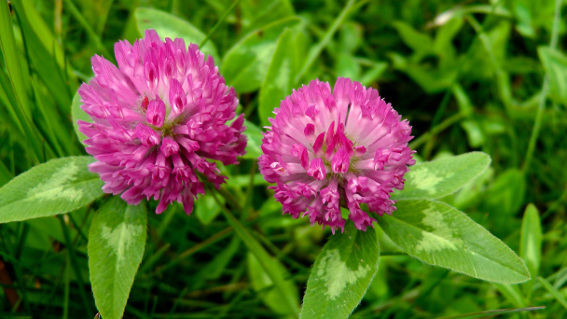 Great-looking red clover blossoms
Great-looking red clover blossoms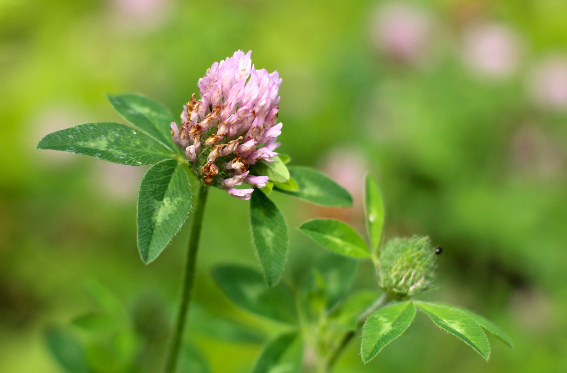 Sub-optimal red clover blossoms
Sub-optimal red clover blossomsSafety Considerations for Red Clover Benefits
Before I share my recipe for Red Clover Tea, let’s discuss safety.
The first consideration is making sure you have excellent quality red clover. Unfortunately, there is a lot of poor quality red clover on the market. If possible, harvest and dry your own to get the best quality. Because it can mold quickly, I recommend harvesting it at its peak and drying it in a single layer. If you live in a humid environment then a dehydrator may be the best drying method. If you purchase red clover, make sure you get freshly dried tops that have vibrant color.
The American Herbal Pharmacopeia Monograph warns us: “Much of the commercial red clover on the market consists of inflorescences that are more brown in color than red, indicating suboptimal harvest, handling, drying or storage conditions.”
Avoid red clover that is brown or has a powdery mildew on its leaves.
Here’s some other safety considerations:
- Until we know more, it is recommended to avoid red clover in people who have (or have had) estrogen-receptor positive cancer.
- There has been some concern that red clover may thin the blood, but this seems to be a concern for red clover that is fermented or not properly dried.
- Red clover has not been established as safe during pregnancy and lactation.
- There is one case study that may show a possible interaction with high doses of methotrexate.16
Red Clover Benefits as a Tea
Red clover makes a wonderful tea and that’s my favorite way to enjoy it.
Also, because red clover is a nutrient-dense herb, it’s best extracted with water. It is often used as a nourishing herbal infusion, using 1 ounce of dry herb infused in a quart of just-boiled water.
I like to combine it with other herbs for a super nutrient-dense packed tea to support heart health, bone health, and promote radiant skin.
The ingredients for this tea are
- 10 grams dried red clover leaves and flowers
- 10 grams dried nettle leaf
- 10 grams dried oatstraw
- 3 cups of water
Place the herbs in a quart jar or something similar. Boil the water and then pour over the herbs, stirring well. Cover. Let stand for 4-8 hours. Strain. Drink as desired within 24 hours. I like it cool, but you can gently warm it if you prefer.
This long steeping time combined with a good dosage of herb means that you are getting lots of nutrients in that brew! You can drink this daily for the best effects, or as desired.
Don’t miss out on your free printable recipe card for Red Clover Tea above this transcript!
If you enjoyed this video on Red Clover Benefits and you value trusted herbal information, then I hope you’ll stick around! The best way to get started is to subscribe to my newsletter below and on YouTube and your favorite podcast app.
Tired of herbal overwhelm?
I got you!
I’ll send you clear, trusted tips and recipes—right to your inbox each week.
I look forward to welcoming you to our herbal community! Know that your information is safely hidden behind a patch of stinging nettle. I never sell your information and you can easily unsubscribe at any time.
One of the best ways to retain and fully understand something you’ve just learned is to share it in your own words. With that in mind I invite you to share your takeaways with me and the entire Herbs with Rosalee community. You can leave comments at the bottom of this page or simply hit reply to my Wednesday email. I read every comment that comes in and I’m excited to hear your herbal thoughts about Trifolium pratense and red clover benefits as an herb for menopausal support.
Okay, you’ve lasted to the very end of the show which means you get a gold star and this herbal tidbit…
I
mentioned that it’s great to grow red clover in your garden because it
is lovely for pollinators and you can harvest your own high quality red
clover. There’s another reason to grow this gorgeous plant. Various
Trifolium species are commonly used as cover crops on farms and in
gardens because as a member of the pea family it fixes nitrogen in the
soil, can break up heavy clay soils, and provides organic biomass that
can be plowed in to improve the soil. So, if you’re a gardener, consider
growing a rotating row of red clover in your garden and harvesting the
flowers before digging the plant back into the earth.
Citations for Red Clover Benefits
Click to show/hide.
Rosalee is an herbalist and author of the bestselling book Alchemy of Herbs: Transform Everyday Ingredients Into Foods & Remedies That Healand co-author of the bestselling book Wild Remedies: How to Forage Healing Foods and Craft Your Own Herbal Medicine. She's a registered herbalist with the American Herbalist Guild and has taught thousands of students through her online courses. Read about how Rosalee went from having a terminal illness to being a bestselling author in her full story here.
